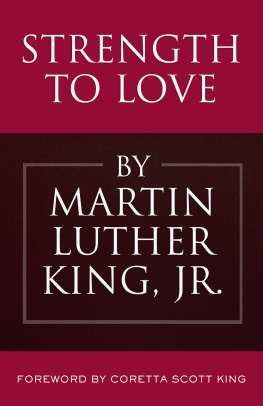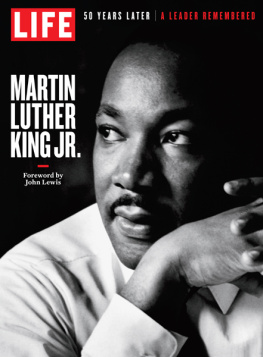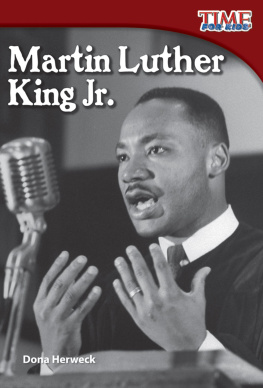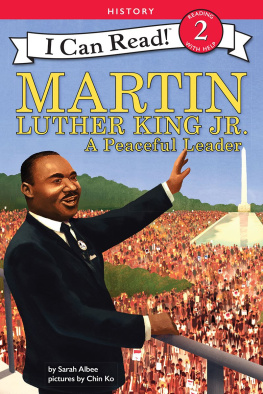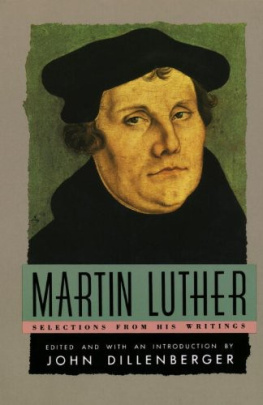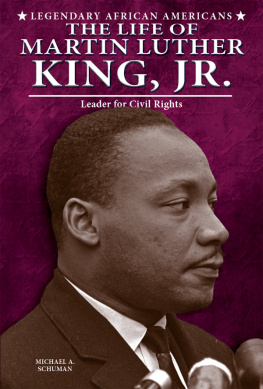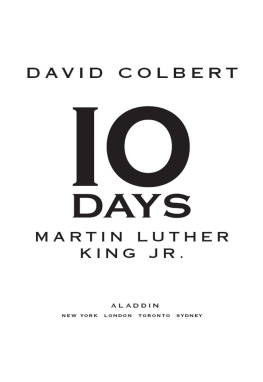Martin Luther King - All Labor Has Dignity
Here you can read online Martin Luther King - All Labor Has Dignity full text of the book (entire story) in english for free. Download pdf and epub, get meaning, cover and reviews about this ebook. year: 2011, publisher: Beacon Press, genre: Politics. Description of the work, (preface) as well as reviews are available. Best literature library LitArk.com created for fans of good reading and offers a wide selection of genres:
Romance novel
Science fiction
Adventure
Detective
Science
History
Home and family
Prose
Art
Politics
Computer
Non-fiction
Religion
Business
Children
Humor
Choose a favorite category and find really read worthwhile books. Enjoy immersion in the world of imagination, feel the emotions of the characters or learn something new for yourself, make an fascinating discovery.

- Book:All Labor Has Dignity
- Author:
- Publisher:Beacon Press
- Genre:
- Year:2011
- Rating:5 / 5
- Favourites:Add to favourites
- Your mark:
- 100
- 1
- 2
- 3
- 4
- 5
All Labor Has Dignity: summary, description and annotation
We offer to read an annotation, description, summary or preface (depends on what the author of the book "All Labor Has Dignity" wrote himself). If you haven't found the necessary information about the book — write in the comments, we will try to find it.
All Labor Has Dignity — read online for free the complete book (whole text) full work
Below is the text of the book, divided by pages. System saving the place of the last page read, allows you to conveniently read the book "All Labor Has Dignity" online for free, without having to search again every time where you left off. Put a bookmark, and you can go to the page where you finished reading at any time.
Font size:
Interval:
Bookmark:
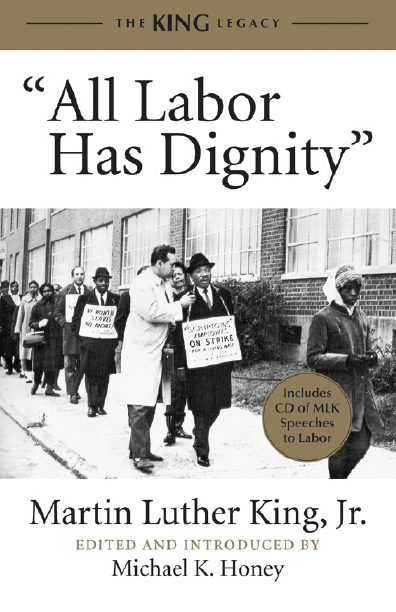
Books by Michael K. Honey
Southern Labor and Black Civil Rights:
Organizing Memphis Workers
Black Workers Remember:
An Oral History of Segregation, Unionism, and the Freedom Struggle
Going Down Jericho Road:
The Memphis Strike, Martin Luther Kings Last Campaign
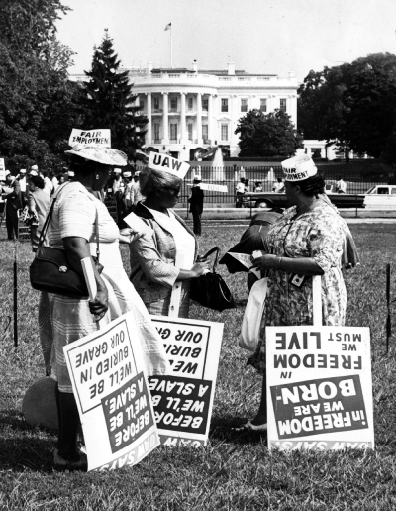
African American women holding signs and wearing hats that show United Automobile Workers union support for civil rights stand in front of the White House during the March on Washington for Jobs and Freedom, August 28, 1963. Walter P. Reuther Library, Wayne State University
All Labor Has Dignity

MARTIN LUTHER KING, JR.
Edited with introductions by Michael K. Honey
BEACON PRESS
BOSTON
Differences have been contrived... to impose disunity by dividing brothers because the color of their skin has a different shade. I look forward confidently to the day when all who work for a living will be one with no thought to their separateness as Negroes, Jews, Italians, or any other distinctions. This will be the day when we shall bring into full realization the American dreama dream yet unfulfilled. A dream of equality of opportunity, of privilege and property widely distributed; a dream of a land where men will not take necessities from the many to give luxuries to the few, a dream of a land where men will not argue that the color of a mans skin determines the content of his character; a dream of a nation where all our gifts and resources are held not for ourselves alone but as instruments of service for the rest of humanity; the dream of a country where every man will respect the dignity and worth of human personalitythat is the dream.
Martin Luther King, Jr.
AFL-CIO National Convention, Miami Beach, Florida
December 11, 1961
CONTENTS
A look to the future
Twenty-fifth Anniversary of the Highlander Folk School, Monteagle, Tennessee, September 2, 1957
It is a dark day indeed when men cannot work to implement the ideal of brotherhood without being labeled communist.
Statement of Martin Luther King and the Southern Christian Leadership Conference in defense of the United Packinghouse Workers Union of America, Atlanta, Georgia, June 11, 1959
We, the Negro people and labor... inevitably will sow the seeds of liberalism.
Twenty-fifth Anniversary Dinner, United Automobile Workers Union, Cobo Hall, Detroit, Michigan, April 27, 1961
If the Negro Wins, Labor Wins
AFL-CIO Fourth Constitutional Convention, Americana Hotel, Miami Beach, Florida, December 11, 1961
I am in one of those houses of labor to which I come not to criticize, but to praise.
Thirteenth Convention, United Packinghouse Workers Union of America, Minneapolis, Minnesota, May 21, 1962
There are three major social evils... the evil of war, the evil of economic injustice, and the evil of racial injustice.
District 65 Convention, Retail, Wholesale and Department Store Union (RWDSU), Laurels Country Club, Monticello, New York, September 8, 1962
Industry knows only two types of workers who, in years past, were brought frequently to their jobs in chains.
Twenty-fifth Anniversary Dinner, National Maritime Union, Americana Hotel, New York City, October 23, 1962
Now is the time to make real the promises of democracy.
Detroit March for Civil Rights, Cobo Hall, Detroit, Michigan, June 23, 1963
The unresolved race question
Thirtieth Anniversary of District 65, RWDSU, Madison Square Garden, New York City, October 23, 1963
The explosion in Watts reminded us all that the northern ghettos are the prisons of forgotten men.
District 65, RWDSU, New York City, September 18, 1965
Labor cannot stand still long or it will slip backward.
Illinois State Convention AFL-CIO, Springfield, Illinois, October 7, 1965
Civil Rights at the Crossroads
Shop Stewards of Local 815, Teamsters, and the Allied Trades Council, Americana Hotel, New York City, May 2, 1967
Domestic Impact of the War in Vietnam
National Labor Leadership Assembly for Peace, Chicago, Illinois, November 11, 1967
The other America
Local 1199 Salute to Freedom, Hunter College, New York City, March 10, 1968
All labor has dignity.
American Federation of State, County and Municipal Employees (AFSCME) mass meeting, Memphis Sanitation Strike, Bishop Charles Mason Temple, Church of God in Christ, Memphis, Tennessee, March 18, 1968
To the Mountaintop: Let us develop a kind of dangerous unselfishness.
AFSCME mass meeting, Memphis Sanitation Strike, Bishop Charles Mason Temple, Church of God in Christ, Memphis, Tennessee, April 3, 1968
INTRODUCTION
The two most dynamic and cohesive liberal forces in the country are the labor movement and the Negro freedom movement. Together we can be architects of democracy.
Martin Luther King, Jr., at the AFL-CIO National Convention, Miami Beach, Florida, December 11, 1961
D uring the last year of his life, Martin Luther King, Jr., put justice for poor and working-class people at the center of his agenda. He launched his Poor Peoples Campaign, demanding that Congress shift the countrys spending from war to housing, health care, education, and jobs. He traveled the country in a whirlwind, scarcely sleeping, preaching the gospel of economic justice. Harking back to the nations history of slavery and segregation, he demanded affirmative programs to overcome generations of denial and neglect for people once enslaved. But he didnt stop there. He sought an Economic Bill of Rights for Native Americans, Mexican Americans, Puerto Ricans, and poorer whites, as well as for blacks. He sought to create a nonviolent army of poor people in jobless inner cities and barrios and in reservations and rural areas. He challenged the country to create an economy of full employment, or lacking that, a tax system that ensured a decent level of income for every American.
Kings exhausting schedule brought him to the brink of collapse. And yet when his colleague and friend James Lawson asked him to Memphis to support black sanitation workers on strike for union recognition, King went. In Memphis, he renewed his faith in peoples movements and found a powerful constituency of the working poor organized into a union-community alliance. In going to Memphis, King returned to an issue he had fought for all of his life: the right of working people to organize unions of their own choosing, free of employer harassment and police intimidation. Unions, he underscored, were the first anti-poverty program and they should be accessible to all who work for wages. Dignity for the working poor became another plank in his Poor Peoples Campaign.
King ultimately lost his life when an assassin cut him down in Memphis on April 4, 1968. Today, that awful murder often blots out the history of the Memphis movement, as well as Kings struggle for the poor and working poor. Too many people still think of King in a narrow sense as a civil rights rather than as a human rights leader, losing sight of the breadth of the alliances and social movements he promoted. In contrast, union advocates remember King as a champion of labor rights, a working-class hero. Perhaps our own time of economic turmoil provides a moment in which we need to see King anew.
When most people imagine King, hes in a suit and tie at the Lincoln Memorial on August 28, 1963. Kings glorious Dream speech plays on television and radio on Kings birthday, often to the exclusion of some of his other important messages. Looking at the television images more closely, we might ask, Who are the men with the little white paper hats standing with such evident satisfaction behind King? On the podium and throughout Kings vast audience one can see these union members, women and men with picket signs, buttons, and hats demanding Fair Employment, Full Employment and Jobs and Freedom. These messages of solidarity were produced in the thousands by unions that also subsidized the public address system and chartered buses and planes that brought tens of thousands of trade unionists to the March on Washington.
Font size:
Interval:
Bookmark:
Similar books «All Labor Has Dignity»
Look at similar books to All Labor Has Dignity. We have selected literature similar in name and meaning in the hope of providing readers with more options to find new, interesting, not yet read works.
Discussion, reviews of the book All Labor Has Dignity and just readers' own opinions. Leave your comments, write what you think about the work, its meaning or the main characters. Specify what exactly you liked and what you didn't like, and why you think so.

